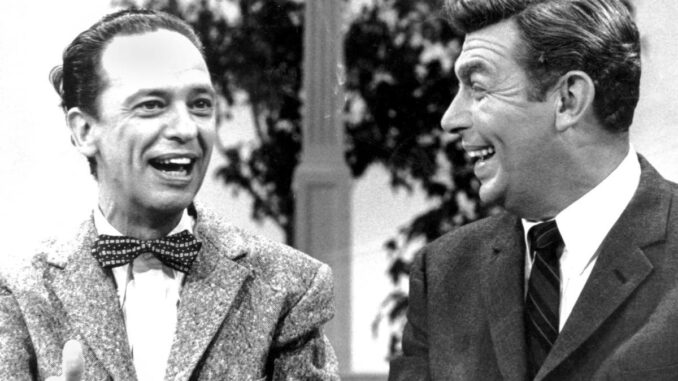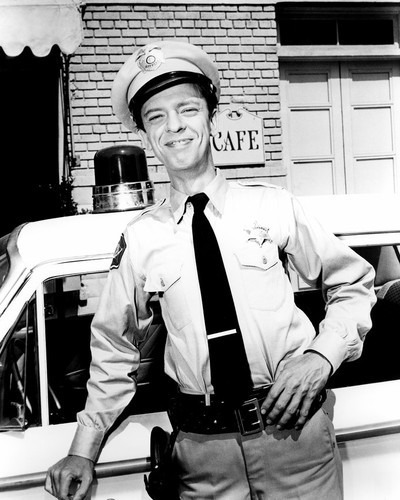
Introduction: From Comic to Commander of Calm
When most people think of Andy Griffith, they picture the calm, wise sheriff of Mayberry — the guy who could solve any problem with a knowing smile and a few kind words. But that wasn’t always the case. In fact, early in his career, Griffith leaned heavily into over-the-top, exaggerated comedy — think “rural clown,” not small-town sage.
So, what changed?
Two words: Don Knotts.
This is the story of how Don Knotts — the jittery, bug-eyed comic genius — played a surprisingly pivotal role in transforming Andy Griffith’s entire on-screen presence. Let’s dive deep into the dynamic that reshaped classic television.
Andy Griffith’s Early Career: The Country Bumpkin Persona
Before The Andy Griffith Show, Griffith was known for his comedic monologues like What It Was, Was Football, portraying clueless country characters who bumbled their way through modern situations. It worked for live performances and sketch comedy, but it had a shelf life.
Griffith’s early roles, like in No Time for Sergeants, saw him as the lovable but naive hillbilly — funny, but one-note.
Enter Don Knotts — The Neurotic Genius
Don Knotts had already carved out a niche as a master of nervous comedy. When he joined The Andy Griffith Show as Deputy Barney Fife, he didn’t just bring comic relief — he brought contrast.
Where Griffith was grounded, Knotts was explosive.
Where Griffith was calm, Knotts was chaos.
That contrast wasn’t just entertaining — it was transformational.
Why the “Straight Man” Role Was Key for Griffith
In classic comedy, the “straight man” isn’t boring — he’s the anchor. Once Don Knotts began taking on the zany energy, it gave Griffith the space to become measured, thoughtful, and even wise.
Instead of fighting for laughs, Griffith leaned into being the center of calm in Mayberry’s madness. That’s how the shift from “rural clown” to “Lincolnesque” began.
Behind-the-Scenes Chemistry That Shaped On-Screen Magic
Griffith and Knotts were friends off-screen, and it showed. Their impeccable timing, mutual respect, and deep trust allowed for natural performances. Knotts once said, “Andy let me shine. He gave me the room to be funny.”
But it wasn’t selfless — in giving Knotts space, Griffith created a better version of himself as a performer.
Griffith’s Shift in Delivery and Demeanor
Watch Griffith in season one versus season five — you’ll see a huge difference. He starts off still trying to be funny himself. But as Knotts finds his rhythm, Andy starts playing more off him, stepping back from punchlines and stepping up in gravitas.
He slowed his cadence.
He softened his reactions.
He became a moral compass, not a gag machine.
The Critics Noticed: ‘Lincolnesque’ Becomes the Buzzword
TV critics started referring to Griffith’s style as “Lincolnesque” — a reference to Abraham Lincoln’s quiet strength and homespun wisdom. That was no accident. It was the result of purposeful, evolving acting — shaped by Knotts’ presence.
Griffith was no longer just delivering lines — he was delivering life lessons.
Why Knotts Leaving Changed the Show’s DNA
Don Knotts left the series after five seasons to pursue film work. The show went on, but the dynamic shifted.
Without Knotts:
-
Griffith became more comedic again.
-
The tone lost its balance.
-
The show slowly lost that special something that had made it sing.
It wasn’t bad, but it wasn’t magic anymore.
Griffith Admitted Knotts Was the Catalyst
Andy Griffith later admitted that Don Knotts helped refine his performance. He once said, “Without Don, I might’ve kept playing it too broad. He helped me realize the power of subtlety.”
It’s rare for a leading man to credit someone else for helping shape their star turn. But Griffith wasn’t just a great actor — he was a smart one.
The Power of Contrast in Comedy
Great duos work because of contrast. Think:
-
Laurel & Hardy
-
Abbott & Costello
-
Martin & Lewis
Griffith and Knotts were no different.
Knotts’ frantic energy needed a counterbalance. Griffith, stepping into that role, evolved from comic sidekick to iconic TV patriarch. That contrast became the heartbeat of Mayberry.
Audiences Felt the Evolution — Even if They Didn’t Know It
Why did audiences fall in love with Andy Taylor?
Because he felt real.
Not just funny. Not just warm. Real.
And that’s because he didn’t play every moment for laughs. He started listening more. Responding more naturally. Becoming a true moral center for the town and for the viewers.

What Andy Griffith Taught Future TV Leads
Griffith’s journey offered a blueprint for generations of actors:
-
Let your co-stars shine.
-
Embrace stillness.
-
Don’t chase every joke.
Characters like Sheriff Taylor paved the way for roles like:
-
Coach Eric Taylor (Friday Night Lights)
-
Jack Pearson (This Is Us)
-
Even Atticus Finch-style figures in modern legal dramas
Don Knotts Never Got the Full Credit — But He Deserved It
Sure, Knotts won five Emmys for Barney Fife — and deserved every one. But his influence reached beyond his own performance.
He helped build Griffith’s legacy.
Without Knotts, there is no calm, commanding Andy Taylor. There’s just another sitcom sheriff with a goofy sidekick.
Griffith’s Legacy Was Built on Balance
Let’s face it — great TV isn’t just about characters. It’s about dynamics.
The genius of The Andy Griffith Show wasn’t just Mayberry’s charm or quirky plotlines. It was that balance — Griffith’s wisdom against Knotts’ whirlwind.
Take away that balance, and you lose the soul of the show.
The Evolution Was Intentional, Not Accidental
Some think actors “grow into” roles. But Griffith’s shift was calculated. He knew when to pivot, when to back off the jokes, and when to let the heart of the show shine through.
That takes more than talent — it takes awareness, humility, and trust in your co-stars.
Mayberry Was a Mirror — and Knotts Polished the Reflection
Mayberry may have been fictional, but its lessons felt real. Sheriff Andy Taylor became a symbol of calm wisdom during turbulent times. And that evolution, from “rural clown” to “Lincolnesque icon,” only happened because Griffith had Don Knotts reflecting back at him — pushing him to be better.
It was chemistry.
It was comedy.
It was legacy.
Conclusion: One Duo, Two Legends, Timeless Impact
Andy Griffith and Don Knotts didn’t just make us laugh. They showed us how powerful character evolution can be — how stepping back can sometimes move you forward. Griffith’s journey from comic relief to the heart of Mayberry wouldn’t have happened without Knotts’ neurotic brilliance nudging him in the right direction.
Their bond wasn’t just TV gold — it was the kind of partnership that rewrote the rules of sitcom stardom.
So the next time you watch The Andy Griffith Show, remember: behind every wise sheriff is a manic deputy helping him rise to greatness.
FAQs
1. How did Don Knotts influence Andy Griffith’s acting style?
Knotts brought high-energy comedy that allowed Griffith to step back and play the wise, calm straight man — transforming his character into a more grounded and iconic figure.
2. Did Andy Griffith and Don Knotts get along off-screen?
Yes, they were close friends with deep mutual respect. Their off-screen chemistry contributed to their flawless on-screen performances.
3. Why was Andy Griffith called ‘Lincolnesque’?
Because his character began to embody quiet strength, moral authority, and wisdom — similar to how Abraham Lincoln is often portrayed.
4. What changed after Don Knotts left the show?
Griffith’s character shifted back toward more comedy, and the show lost the sharp contrast that had made it so unique and compelling.
5. Did Andy Griffith ever publicly credit Don Knotts for his success?
Yes, Griffith acknowledged that Knotts helped him evolve by encouraging more subtle and grounded performances. Their partnership was foundational to the show’s success.